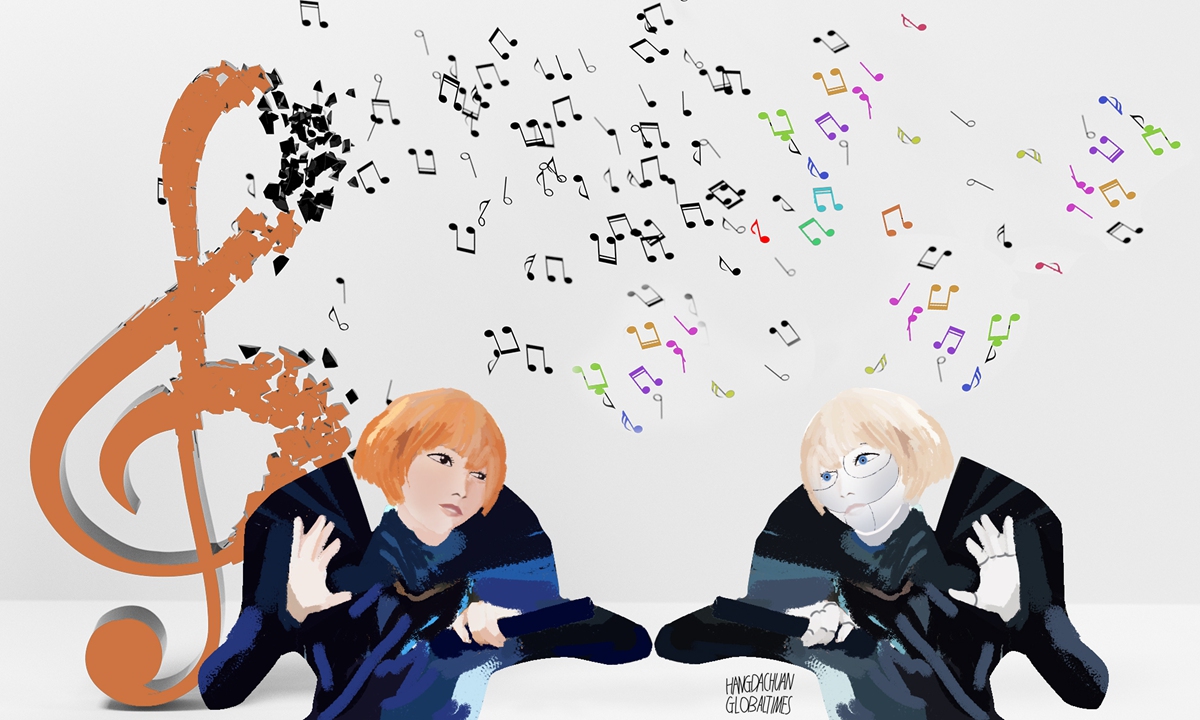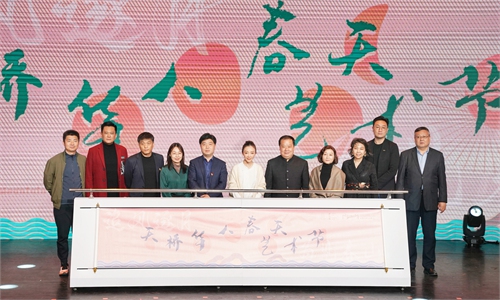ARTS / CULTURE & LEISURE
Beware: AI-generated singing voices pleasing to the ear

Illustration: Hang Dachuan/Global Times
Though she has not released any new singles or albums, Singaporean singer Stefanie Sun, or Sun Yanzi, has been dominating trending lists on Chinese social media recently. However, the reason for this is a little strange, as it is an AI version of Sun that is topping the charts.The popular tunes, which see Sun's voice digitally inserted in place of the original singer for songs like Jay Chou's "Hair Like Snow" or "Rainy Day" by music group Nan Quan Mama - both of which have over 1 million views on video sharing website Bilibili - have resulted in some surreal experiences for music fans.
Some fans have embraced the AI-generated songs, saying they offer an option for people with different tastes in music. Sun is no stranger to Chinese audiences. Rising to fame in the early 2000s with her hit albums, she quickly became one of the most popular singers in China. Her unique voice, coupled with her charming personality, won the hearts of millions of fans across the Chinese-speaking world.
Despite her popularity, Sun has not held any solo concerts in China since her last appearance at the end of 2019. This has left many fans feeling disappointed, especially given the fact that though she had not released any new albums since 2017, several singles have been released over the years.
Now a mother of two, Sun hosted several online concerts during the pandemic. A one-hour online concert in 2022 orchestrated by Douyin, the Chinese regional version of TikTok, saw more than 240 million people watch her perform. Though Sun last week appeared at a music festival in Central China's Changsha, fans are far from satisfied as she only sang a couple of songs. Therefore, the recent AI-generated music featuring her voice has provided some consolation for fans that miss her performances.
But others have also raised concerns about copyright infringement. So far, the creators of the aforementioned popular AI-generated music have claimed that they will delete the works if "there's copyright infringement," but it is unclear if this provides enough protections.
On Tuesday, Douyin unveiled an industry initiative that calls for users to use clear labels to differentiate AI-generated content from other content, reiterating that it is forbidden to generate content that infringes on the copyrights of others.
The issue of copyright infringement is not new to the music industry. In recent years, there have been many cases of artists being sued for sampling other artists' work without permission. With the rise of AI-generated music, the issue is becoming more complicated.
Another issue raised by the AI-generated music is its potential impact on lesser-known artists. In China's highly competitive music industry, there are many talented artists who struggle to get their music heard.
The rise of AI-generated music featuring popular artists like Sun could further marginalize these artists and make it even harder for them to gain a foothold in the industry.
Despite these concerns, there's no denying the popularity of the AI-generated music featuring Sun's voice. Fans have praised the technology for its ability to create a diverse range of music, and for its ability to bring Sun's voice back into the spotlight.
The AI-generated music has also made it possible to commemorate singers who had passed away, highlighted by online calls for more AI works of musicians Teresa Teng, Wong Ka Kui, Leslie Cheung and Yao Beina.
AI technology has already been used to create hit songs, even symphonies, and it's likely that we'll see even more AI-generated music in the future, which will continue to shape the future of the music industry.


